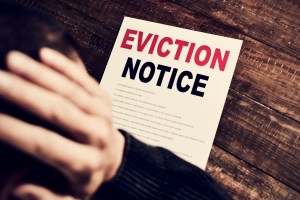As the coronavirus crisis continues to linger, another crisis is sweeping the U.S. The economic fallout from the pandemic has resulted in a massive increase in evictions as Americans continue to experience layoffs due to thousands of business closures. A new study is now shedding light on which citizens are the hardest hit by this wave of evictions and sadly, minorities appear to be at the top of the list.
Data compiled by the Center for Public Integrity revealed that out of 8,000 evictions beginning in March, nearly two-thirds of the tenants resided in predominantly Black neighborhoods with a median household income below $42,000.
While the federal government has held a moratorium in place through much of the pandemic, that policy will expire at the end of this year. This poses a serious threat to those who will still be unemployed or furloughed at that time, especially residents of color.
“[A moratorium’s] effectiveness really depends on how comprehensive it is,” explained Alieza Durana, who works for the Princeton Eviction Lab, which tracks evictions in 17 U.S. cities. “Normally, a moratorium can affect three different stages of the eviction process. The first relates to the filing of an eviction…The second part of the process relates to the court process itself, and the third relates to the enforcement of the eviction process is usually local law enforcement, such as a sheriff that will go to do a lockout or to remove [a tenant’s] belongings.”
Durana went on to add, “The most effective way to prevent people from being forcibly removed is to either ban all three or to, at the very least, prevent filings, because even the threat of an eviction hanging over a family can negatively impact their physical and mental well-being.”
The Princeton Eviction Lab has recorded over 60,000 evictions since the start of the pandemic.
Back in July, the National Low Income Housing Coalition, a nonprofit that advocates for affordable housing, called the eviction crisis amongst low and middle income people of color “deeply troubling.”
“We’ve known for some time that there is a tremendous risk of extremely low-income renters being harmed by this crisis and being evicted, and we’ve known that such evictions would have a disproportionate impact on Black and brown and extremely low-income and historically marginalized people.” said Diane Yentel, president and CEO of the National Low Income Housing Coalition.

Discover more from Baller Alert
Subscribe to get the latest posts sent to your email.







